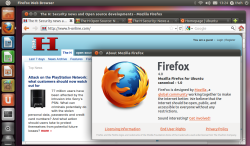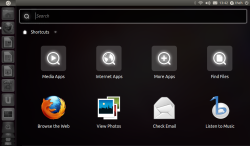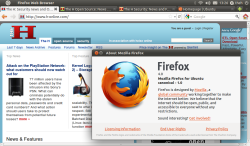Canonical releases Ubuntu 11.04 "Natty Narwhal"
 Following three alphas and two betas, Canonical and the Ubuntu developers have announced the release of version 11.04 of their popular Ubuntu Linux distribution, code named "Natty Narwhal". Ubuntu 11.04 is the second standard release to be issued following the latest Long Term Support (LTS) edition of Ubuntu, version 10.04 LTS. Ubuntu is sponsored by UK based Canonical Ltd.
Following three alphas and two betas, Canonical and the Ubuntu developers have announced the release of version 11.04 of their popular Ubuntu Linux distribution, code named "Natty Narwhal". Ubuntu 11.04 is the second standard release to be issued following the latest Long Term Support (LTS) edition of Ubuntu, version 10.04 LTS. Ubuntu is sponsored by UK based Canonical Ltd.

![]() The default Unity desktop running Firefox 4.0.
Based on the 2.6.38.2 Linux kernel, Ubuntu 11.04 features Unity as the distribution's new default desktop – Unity is developed in-house by the Ubuntu developers, replacing the GNOME Shell. The Unity Launcher is composed of a dock with a single global menu bar and notification area; a user can pin applications to the dock and launch them by clicking on the icon in the dock, or they can use it to switch between running applications. When there are too many icons for the display, the launcher dock becomes scrollable, unfolding when the user's mouse pointer moves over it. File type aware drag-and-drop is also supported allowing files to be dragged from the file manager and dropped onto the appropriate application
The default Unity desktop running Firefox 4.0.
Based on the 2.6.38.2 Linux kernel, Ubuntu 11.04 features Unity as the distribution's new default desktop – Unity is developed in-house by the Ubuntu developers, replacing the GNOME Shell. The Unity Launcher is composed of a dock with a single global menu bar and notification area; a user can pin applications to the dock and launch them by clicking on the icon in the dock, or they can use it to switch between running applications. When there are too many icons for the display, the launcher dock becomes scrollable, unfolding when the user's mouse pointer moves over it. File type aware drag-and-drop is also supported allowing files to be dragged from the file manager and dropped onto the appropriate application
Other new Unity Launcher features in 11.04 include full keyboard navigation support and right-click context menu quick-lists, allowing applications to offer customised shortcuts to their functionality. Users can search for applications and files using the various implementations of Lenses. By pressing the Super or Windows key, users can launch the "Dash" start screen for various common tasks, including searching for applications and launching them, browsing applications and searching or browsing for files. The "Dash" can also be brought on screen by clicking the Ubuntu logo in the top-left corner of the screen.
Ubuntu's changes go further than the desktop launcher, though. For example, applications can now, and often automatically do, use the single global menu bar to display their drop-down menus. The space at the top of the screen is normally filled with the name of the application and the menu only appears when the user mouses over the menu bar. There are also space saving scrollbars which only show up as thin lines in applications; when the user mouses over the scrollbar, a "handle" appears beside the line and the user can drag either it or the scrollbar to adjust the positioning.
The new desktop requires 3D hardware to perform its animated transitions and compositing. For users with hardware not capable of 3D, a "classic" desktop is available which is similar, but not identical to the GNOME 2 desktop of previous versions. Canonical is developing Unity 2D which will replace this mode in a future release.

![]() Users can quickly find applications via search.
Natty Narwhal includes the latest Firefox 4.0 web browser, version 2.0 of the Banshee media player and LibreOffice 3.3.2 as the default office suite. Other package updates include X.org 1.10.0 and Mesa 7.10.1, version 0.9.2 of the Shotwell photo manager and version 2.13 of the BitTorrent peer-to-peer file sharing client. The Upstart event-based init replacement has been updated to version 0.9.7-1, which includes several new features over the previous version, such as support for chroot. Details on these can be found on the Technical Overview Upstart wiki page.
Users can quickly find applications via search.
Natty Narwhal includes the latest Firefox 4.0 web browser, version 2.0 of the Banshee media player and LibreOffice 3.3.2 as the default office suite. Other package updates include X.org 1.10.0 and Mesa 7.10.1, version 0.9.2 of the Shotwell photo manager and version 2.13 of the BitTorrent peer-to-peer file sharing client. The Upstart event-based init replacement has been updated to version 0.9.7-1, which includes several new features over the previous version, such as support for chroot. Details on these can be found on the Technical Overview Upstart wiki page.
Improvements have been made to the Software Centre, including support for ratings and reviews. Canonical's cloud storage platform, Ubuntu One, has also received updates, such as support for selective syncing and a launcher icon that can display sync progress.
A refresh of the Server version of Ubuntu was released as well as the desktop version. The Server edition comes without a graphical user interface. The Server edition of 11.04 features support for Intel's Intelligent Power Sharing and includes PowerNap 2.0, a tool for throttling a server's power consumption. For easier provisioning, the release includes the Marionette Collective, a set of tools from Puppet Labs and the cobbler install server. For cloud deployments there are also updates to libvirt and, while the system comes with the latest stable release of Eucalyptus's EC2 clone, 2.02, there is also a "technology preview" of OpenStack's 2011.2 release, "Cactus ".

![]() Firefox 4.0 running full screen on Ubuntu 11.04.
Netbook images of Ubuntu for machines with ARM processors are also available. The ARM version of Ubuntu ships with a version of Canonical's Unity 2D interface by default; this aims to improve usability and the user interface design on systems with low-end 2D graphics hardware. Information, including known issues, about the ARM version of Natty Narwhal can be found on the Ubuntu wiki.
Firefox 4.0 running full screen on Ubuntu 11.04.
Netbook images of Ubuntu for machines with ARM processors are also available. The ARM version of Ubuntu ships with a version of Canonical's Unity 2D interface by default; this aims to improve usability and the user interface design on systems with low-end 2D graphics hardware. Information, including known issues, about the ARM version of Natty Narwhal can be found on the Ubuntu wiki.
More details about this latest stable release, including a list of known issues as well as links to Kubuntu, Xubuntu and Edubuntu images, can be found in the Release Announcement, Release Notes and on the Technical Overview page. Desktop and Server editions (though they are no longer "Editions") of Ubuntu 11.04 are available to download as ISO images for 32-bit and 64-bit systems from one of the project's mirrors.
Users currently running Ubuntu 10.04 LTS or 10.10 on a desktop system can upgrade by pressing Alt+F2 and typing "update-manager -d" (without the quotes) into the command box. Users running versions of Ubuntu that are earlier than 10.04 LTS will need to upgrade to 10.04 LTS first. The next major release following Ubuntu 11.04 will be 11.10 "Oneiric Ocelot", scheduled to arrive in October 2011.
See also:
- Ubuntu Transforms Your PC Experience, press release from Canonical
- Ubuntu and the price of Unity, a features from The H.
- Faster booting with Upstart, a feature from The H.
(crve)
![Kernel Log: Coming in 3.10 (Part 3) [--] Infrastructure](/imgs/43/1/0/4/2/6/7/2/comingin310_4_kicker-4977194bfb0de0d7.png)

![Kernel Log: Coming in 3.10 (Part 3) [--] Infrastructure](/imgs/43/1/0/4/2/3/2/3/comingin310_3_kicker-151cd7b9e9660f05.png)
















